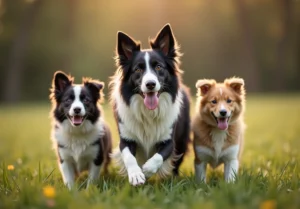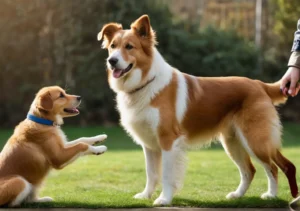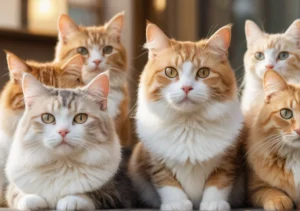Cats are known for their agility and grace, but many felines today are struggling with a growing epidemic: obesity. Why are cats obese? Let’s explore the reasons behind this concerning trend and how we can help our furry friends maintain a healthy weight.
Genetic Predisposition
Certain breeds of cats may have a higher genetic predisposition to obesity. For example, Persian and Maine Coon cats are known to be more prone to weight gain due to their genetic makeup. These breeds may have a slower metabolism or a higher appetite, making it easier for them to pack on the pounds. Keep this in mind when considering the risk factors for obesity in your feline friend.
Overfeeding
When it comes to our furry friends, it can be tempting to show our love through food. However, overfeeding can have serious consequences for a cat’s health. Not only can it lead to obesity, but it can also result in other health issues such as diabetes and joint problems. To prevent overfeeding, it’s important to follow feeding guidelines provided by your veterinarian and resist the urge to free-feed. Paying attention to portion sizes and sticking to a regular feeding schedule can help keep your cat at a healthy weight.
Extra Tip: Consider using interactive feeders to make mealtime more engaging for your cat. These feeders can slow down their eating pace and provide mental stimulation, which can help prevent overeating and promote a healthier weight.
Lack of Exercise
Regular physical activity is crucial for keeping our feline friends at a healthy weight. Cats, especially indoor ones, can easily become sedentary if not provided with opportunities to move around and play. Engaging in interactive play sessions with your cat using toys like laser pointers or feather wands can help them burn calories and stay active. Encouraging climbing on cat trees or setting up shelves for them to explore can also promote exercise. Additionally, creating a stimulating environment with hiding spots and puzzle toys can inspire natural behaviors like hunting, keeping them mentally and physically engaged.
Poor Diet Choices
The quality of food plays a significant role in a cat’s weight and overall health. Avoid free feeding or leaving food out all day, as this can lead to overeating. Opt for high-quality cat food with adequate protein and limited carbohydrates to help maintain a healthy weight. Consider feeding smaller and more frequent meals to prevent excessive calorie intake. Monitor your cat’s portion sizes and adjust them accordingly based on their activity level and weight. Remember, treats should be given in moderation and considered as part of their daily caloric intake.
Additional Unique Insight:
– Rotating protein sources such as chicken, fish, and turkey can provide a more balanced diet for your cat and prevent them from getting bored with the same food every day. This variety can also mimic their natural hunting instincts and keep mealtime exciting for them.
Medical Conditions
Cats can become obese due to various medical conditions that affect their metabolism or ability to process food properly. Hypothyroidism is one such condition where the thyroid gland doesn’t produce enough hormones, leading to weight gain. Another culprit can be diabetes, causing fluctuations in blood sugar levels and weight gain. To address these issues, it’s crucial to consult a veterinarian who can diagnose the specific condition and recommend appropriate treatment, which may include medication, dietary changes, or specialized feeding plans tailored to your cat’s needs.
Stress and Anxiety
Just like humans, cats can also experience stress and anxiety, which can lead to emotional eating and subsequent weight gain. Changes in their environment, such as moving to a new home or the introduction of a new pet, can trigger these feelings. To help alleviate stress and anxiety in your feline friend, ensure they have a safe and comfortable space, plenty of mental and physical stimulation, and a consistent routine. Consider interactive toys, scratching posts, and calming pheromone diffusers to create a soothing atmosphere. Additionally, engaging in regular playtime and bonding activities can help reduce stress levels in cats.
Unique Insight: Providing vertical spaces, such as cat trees or shelves, can offer your cat a sense of security and territory, reducing feelings of stress and anxiety that may lead to overeating.
Environmental Factors
A cat’s living environment plays a significant role in determining their weight. If your feline friend has easy access to food throughout the day, they might overeat out of boredom or stress. Similarly, if they lack opportunities for play and exercise, they can become sedentary and gain excess weight. To combat this, create a stimulating environment with interactive toys and climbing structures to keep them active. Additionally, establish a feeding schedule instead of free-feeding to control their food intake. By addressing these environmental factors, you can help your cat maintain a healthy weight and lead a happier, more active life.
Tips for Weight Management
- Proper Portion Control: Make sure to measure your cat’s food portions to avoid overfeeding. Follow the feeding guidelines provided by your veterinarian based on your cat’s size and activity level.
- Regular Exercise: Engage your cat in daily play sessions to encourage physical activity. Use toys that encourage movement and mimic hunting behaviors to keep them engaged.
- Healthy Food Choices: Opt for high-quality, balanced cat food that meets your pet’s nutritional needs without excessive calories. Avoid feeding them table scraps or high-calorie treats.
- Monitor Weight Regularly: Keep track of your cat’s weight and body condition score to catch any fluctuations early on. Consult your vet if you notice any sudden weight gain or loss.
- Consult a Veterinarian: If you’re unsure about your cat’s weight or how to manage it effectively, don’t hesitate to seek professional advice. Your vet can provide tailored recommendations and guidance for your cat’s unique needs.
By implementing these practical tips for weight management, you can help your cat achieve and maintain a healthy weight, promoting their overall well-being and quality of life.
Fun Facts About Cat Metabolism
Did you know that cats have a higher protein requirement than dogs? This means they need a diet rich in protein to support their metabolism. Additionally, cats are obligate carnivores, meaning their bodies are designed to thrive on meat-based diets, which can make it easy for them to consume excess calories if not monitored closely.
Another interesting tidbit is that cats have a slower metabolism compared to dogs. This slower metabolism can lead to weight gain if cats consume more calories than they burn. In the wild, cats are designed to conserve energy and be efficient hunters, but in a domestic setting with readily available food, this can pose a challenge for maintaining a healthy weight.
To help combat feline obesity, it’s important to provide a balanced diet that meets their high protein needs while monitoring portion sizes. Regular exercise and interactive playtime can also help keep your cat active and maintain a healthy weight.
By understanding these unique aspects of cat metabolism and taking proactive steps to promote a healthy lifestyle, you can help your furry friend live a long and happy life.
- Ensure your cat’s diet is high in protein to support their metabolism.
- Monitor portion sizes to prevent excess calorie intake.
- Engage in interactive playtime to keep your cat active and maintain a healthy weight.
- Regularly monitor your cat’s weight and adjust their diet and exercise routine accordingly.
Alex, a passionate animal lover, has experience in training and understanding animal behavior. As a proud pet parent to two dogs and three cats, he founded AnimalReport.net to share insights from animal experts and expand his knowledge of the animal kingdom.




